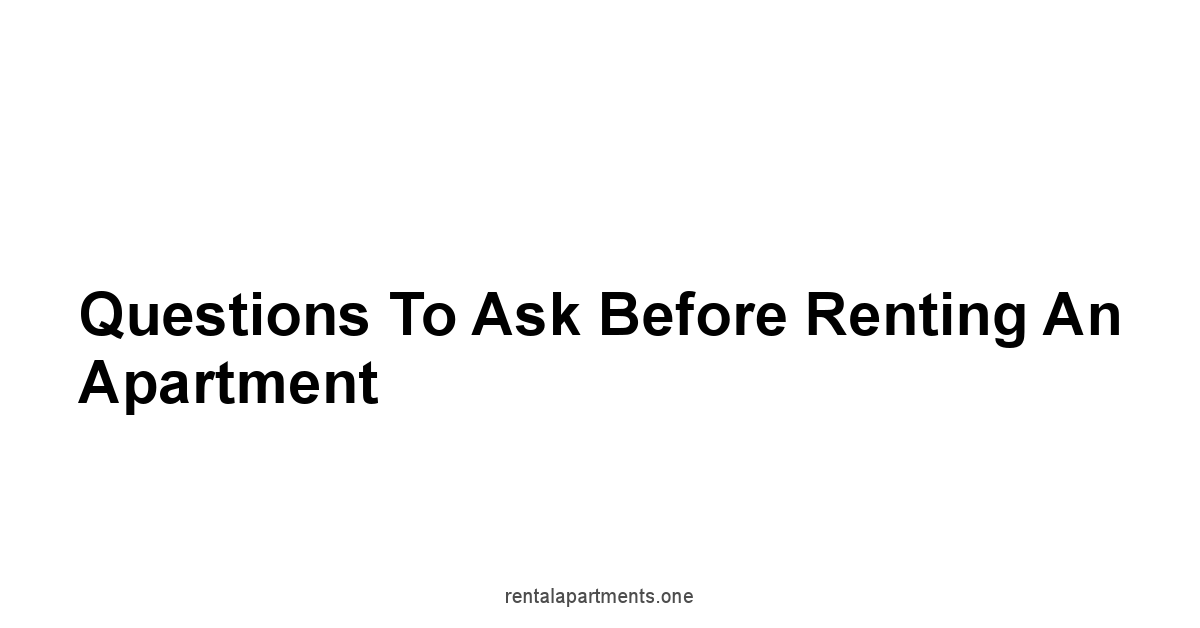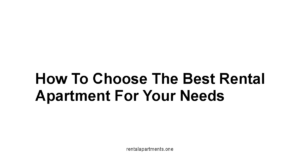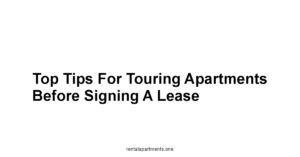Before signing on the dotted line for any apartment, ask the critical questions, what’s the square footage and layout, check the walls, floors, and ceilings for potential issues, verify the natural light with enough windows, and make sure there is sufficient storage because, according to a 2022 study by the U.S.
Census Bureau, the average apartment size in the US is approximately 941 square feet, so every inch counts.
It’s not just about the pretty pictures, it’s about the space you will live in, a space that must work for you daily.
Let’s break it down so you know what to look for:
- Square Footage: Don’t just take their word for it; verify the actual space. An 800 sq ft apartment might be only 750, that’s a loss of 50 square feet. If you can, measure it yourself or ask for official documents, this ensures the space matches its claims. Consider how the space feels; is it open or cramped? Does it match the advertised measurements?
- Layout: The floor plan must flow with your lifestyle. Consider these points:
- Is the kitchen near the dining area?
- Is the bedroom far enough from the living space?
- Does the bathroom offer privacy?
- Is there a natural flow from the entrance to other rooms?
- Structural Check: Look closely for any structural issues.
- Walls: check for cracks, holes, water damage and insulation. Tap the wall and listen if it sounds solid or hollow.
- Floors: Make sure they are level, check carpets for cleanliness and stains, look for scratches in hardwood and listen for creaks.
- Ceilings: Check for water stains, cracks, damage and mold. Always document the issues by taking pictures.
- Natural Light: The amount of light has a direct impact on your wellbeing, don’t underestimate it. Check for the number of windows, their size, and the direction they face, south-facing windows usually get the most light. Also check what might be blocking natural light such as trees, or other buildings.
- Storage Space: Lack of storage is a deal breaker. Check for closet space, kitchen cabinet storage, bathroom storage, pantries or linen closets and if they are sturdy enough for your belongings. Inventory your belongings and see if they can fit.
Once you are done with the structure, its time for the money, rent is just the beginning, it’s time to talk about money, the hidden cost of living in an apartment because according to a study by Zillow, renters spend an average of 28% of their income on rent, so knowing where every penny goes is very important.
- Rent Inclusions: Never assume, clarify what’s covered; water, trash, sewage, and common area maintenance, and what’s not, such as electricity, gas, internet and cable. Always get it in writing, don’t rely on just the word of the landlord.
- Utility Costs: Don’t let the utility bills surprise you; ask the landlord for average utility costs of the place from previous tenants. If possible talk to the current tenants or check with utility companies for the average costs of the specific address. Consider insulation, your usage habits and the size of the apartment.
- Security Deposit: Know the security deposit details; how much is it and how can you get it back? Usually one to two months’ rent is the normal deposit. Take pictures of everything before moving in and when you move out. The landlord must give a written explanation if they deduct anything from it, and they can’t deduct for wear and tear, that’s illegal.
- Move-in Fees: Don’t be blindsided by move-in fees, such as, application fees, admin fees, move-in fees, pet fees and elevator fees, if applicable. Get a breakdown of every fee and negotiate if you can.
- Late Fees: Avoid late fees by setting up reminders for the rent and check for any grace periods if they exist. Late fees are avoidable and stated in the lease, make sure you read it.
Moving beyond the apartment itself, the neighborhood plays a huge role in your daily life, make sure it’s a place you can see yourself living in because, according to a study by the National Association of Realtors, 66% of home buyers and renters say neighborhood is just as important, or more important than the home itself, and that can apply to an apartment as well, it’s not just about the building itself, it’s also the surrounding areas.
- The Neighborhood Vibe: Walk around at different times of the day to understand the area’s vibe. Are streets clean? Is it safe? Do you feel safe?
- Noise Levels: Check the noise during the day and night. A noisy area can impact your sleep and focus.
- Grocery Stores: A nearby grocery store makes life easier. Is it easy to access by foot, car or public transportation?
- Public Transportation: Check for bus stops, trains, and subway stations. Is it accessible to your work or to the places you want to go?
- Parking: Is parking included or extra? Assigned or first come first served? Is there guest parking? Check the parking lot and make sure it suits your needs.
Now, let’s check the rules and regulations.
Every apartment has its rules, not knowing them can lead to problems, make sure you read and understand everything before you sign.
- Pet Policy: If you have a pet, check the pet restrictions on size, type and breed and all the associated fees; pet deposits, monthly rent or one time fees.
- Guest Policies: Know the rules on overnight guests, parking and use of amenities. Ask the landlord for a written copy of the policies.
- Subletting: If you think you might need it, check the rules. Does it need approval? And what responsibilities do you have?
- Quiet Hours: Respect the neighbors, know the quiet hours, that are usually at night and check for the morning hours too.
- Lease Term: Know the length of the lease and options at the end such as renewal or moving out. Read the entire lease carefully.
Maintenance and repairs are unavoidable, you need to know who to call and how quickly they respond because according to a survey done by the National Apartment Association, 75% of renters cite timely maintenance as a critical factor influencing their satisfaction, so don’t take this lightly.
- Contact for Repairs: Get all contact info for landlords, property managers or maintenance teams; phone, email or online portals.
- Response Times: How quick is their response? How long for routine repairs, and emergency repairs?
- Emergency Maintenance: Get the details; who is the emergency contact and procedures. Leaks, power outages or lockouts require quick action.
- Pest Control Policy: Pests are a reality, know their pest control plan, is it included? And what happens if pests show up.
- Common Areas Cleaning: Clean common spaces are a reflection of good management. Check hallways, stairwells, lobbies, laundry rooms, gyms and pools.
Last but not least, safety is non-negotiable.
You need to feel safe in your place, and all around your place.
- Neighborhood Safety: Walk around and observe if it feels safe, well-lit streets, low crime rates, visible security and active communities are signs of a safe neighborhood.
- Security Cameras: Check for cameras at the entrances, hallways, garages and elevators, an extra layer of protection is always welcome.
- Building Access: Check the doors, locks, gates and entry systems, do they work?
- Detectors: Make sure smoke and carbon monoxide detectors are working and installed in the right places.
- Emergency Procedures: Get all the details on fire safety, natural disasters, medical emergencies or building issues, what’s the plan and where is the emergency exit.
Finally, the landlord or property manager can make or break your renting experience, choose wisely, get a read on the person you will deal with.
It’s all about these details, you must understand these details before signing the lease.
The Apartment’s Bones: Structure and Space
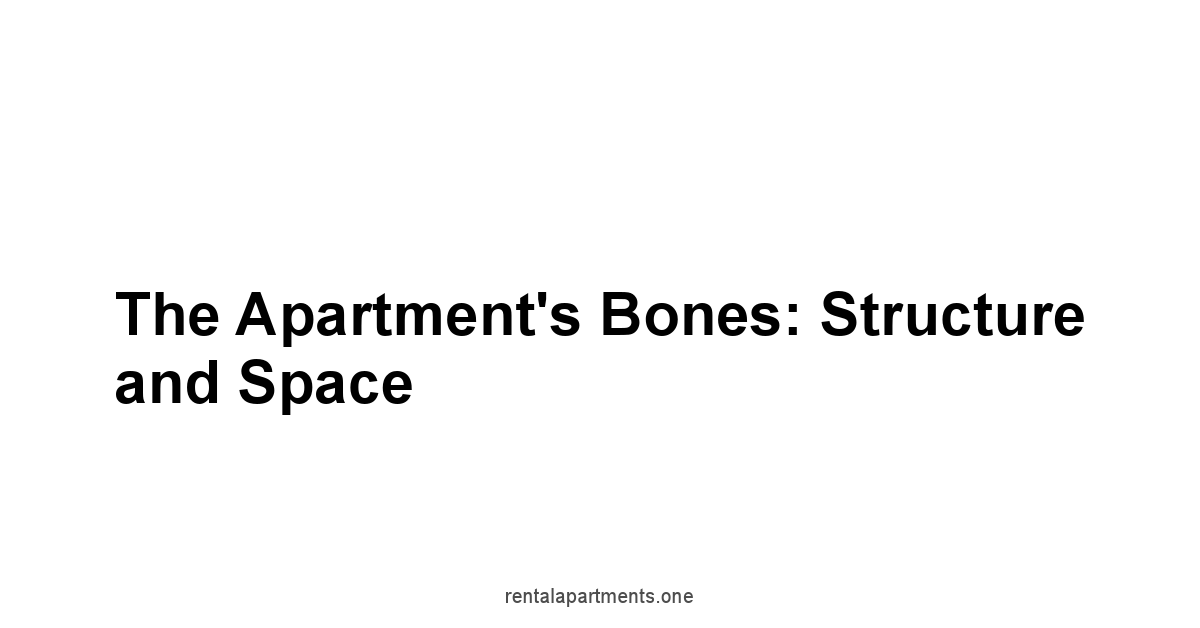
Before you sign anything, you need to know what you’re actually getting.
It’s not just about the price, it’s about the space you’ll inhabit.
You wouldn’t buy a car without checking the engine, would you? So don’t rent an apartment without understanding its basic structure. This is where you live, make sure it feels right.
You need to get into the specifics, the nuts and bolts.
Don’t just walk through and nod, ask questions and make sure it’s a place where you will be happy. Think about how you’ll actually live in the space. Don’t let charm blind you to practical issues.
It’s about your real daily life, not just pretty pictures.
What’s the square footage? Get the real number.
Don’t take their word for it. Get the actual square footage, not just a guess.
Sometimes what they say and what’s real are two different things.
A smaller space than advertised means less room for your things and less space to breathe.
- Why It Matters: Square footage determines how much space you actually have. It impacts furniture placement, how comfortable you will feel and how much you can store in the apartment.
- How to Check: Ask for official documentation or measure it yourself if possible. Bring a tape measure if you can. You might be surprised by what you find. Don’t assume the listing is accurate.
- Things to Consider:
- Does the square footage include hallways or storage areas?
- How does the space feel? Is it open or cramped?
- Does the listed square footage match what you see?
- If possible, compare the listed measurements to the floor plan
- Example: An apartment listed as 800 sq ft might be only 750 sq ft. That 50 sq ft is valuable, especially in a small apartment.
How’s the layout? Does it fit your life?
The layout matters as much as the square footage.
A poorly laid-out apartment can feel smaller and more frustrating than a well-planned one. Think about how you move through a space daily.
- Why It Matters: A good layout means you can move easily between rooms and that your daily activities flow naturally. A bad layout can be a daily annoyance.
- Things to Consider:
- Is there a natural flow from the entrance to other rooms?
- Is the kitchen close to the dining area?
- Is the bedroom far enough away from the living space?
- Does the bathroom layout offer privacy?
- Common Layout Issues:
- Long, Narrow Rooms: They can be hard to furnish.
- Poor Room Flow: The kitchen is far from the dining area, or the bathroom opens directly into the living room.
- Lack of Privacy: Bedrooms near the main living space can cause noise issues
- Evaluate: Try to visualize your furniture in the space and see if the layout works for your life. Don’t just look at it; think about living in it.
Check the walls, floors, ceilings. Any issues?
Look closely. Don’t be shy about examining the details. Small problems now can become big problems later. This is your space, it should be solid.
- Why It Matters: Structural problems can affect your comfort and your security. They can also lead to disputes with the landlord.
- Wall Check:
- Are there cracks, holes, or signs of water damage?
- Are the walls properly insulated?
- Is the paint fresh? Are there stains or discoloration?
- Tap on walls, do they sound hollow?
- Floor Check:
- Are the floors level? Look for uneven spots.
- Are the carpets clean? Are they worn, stained or loose?
- Are the hardwood floors scratched, cracked or warped?
- Listen for creaks. Do they sound solid or flimsy?
- Ceiling Check:
- Are there water stains, cracks or signs of damage?
- Are there any visible leaks?
- Is the ceiling in good condition?
- Check the corners and edges for any signs of mold.
- Note Take pictures and document any issues you find before you move in. It protects you.
Are there enough windows? Natural light matters.
Natural light can make a big difference in how a place feels. A dark apartment can feel depressing.
Check how much sunlight the apartment receives during the day.
- Why It Matters: Natural light affects mood, energy levels and even your sleep. It makes a space feel more open and inviting.
- How many windows are there in each room?
- How large are the windows?
- What direction do they face? South-facing usually gets the most light
- Is there anything outside blocking the natural light? Trees, other buildings
- Daylight Impact:
- Morning Light: Great for starting the day.
- Afternoon Light: Can heat up the apartment; might need window coverings.
- Evening Light: Gives a warm, calm feeling.
- Artificial Light: Check if the artificial lighting is good as well, especially if the natural light is not ideal. Is there enough lighting in each room? Are there lamps or are the lights fixed?
What’s the storage situation? Closets, cabinets, all that?
Storage is a big deal. You need a place to put your things.
A lack of storage can make an apartment feel cluttered and cramped, no matter how big it is. Make sure you have the right kind of space.
- Why It Matters: Lack of storage means you’ll need to buy storage solutions, or just have to live with clutter. This will impact how comfortable you feel.
- Types of Storage:
- Closets: Are they spacious, with shelves or rods? Is there enough space for your clothes?
- Kitchen Cabinets: How many cabinets and drawers are there? Are they in good condition and can they fit your pots and pans?
- Bathroom Storage: Is there a medicine cabinet or storage under the sink?
- Other Storage: Is there a pantry, linen closet or other storage space?
- Evaluate: Bring inventory of all your clothes and other things to see if it will fit the storage space available. Imagine how much storage you need.
- Check: Open all the doors and drawers. See how much space you really have. Make sure the cabinets and shelves are sturdy.
Money Talk: Costs Beyond the Rent
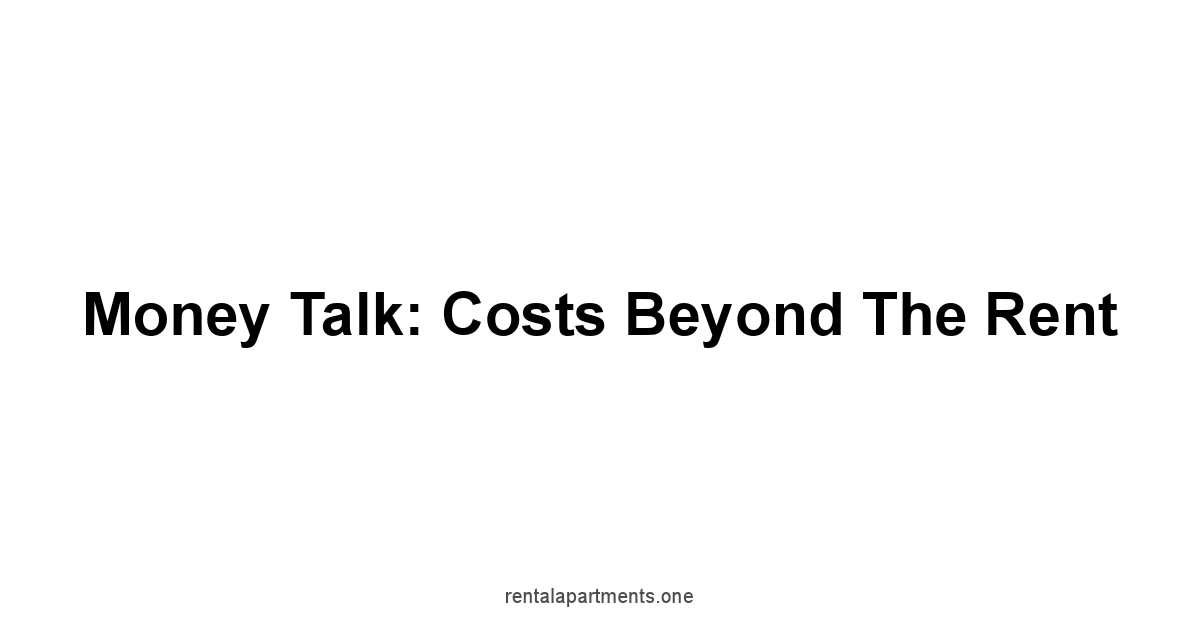
Rent is just the beginning.
You need to know the total cost of living in an apartment, not just the advertised rent.
Hidden costs can add up quickly, and they can hit your pocketbook without warning.
Being prepared is the only way to avoid unpleasant surprises.
Don’t let excitement cloud your judgment when it comes to money. You have to know the real numbers. Look beyond the monthly rent.
Calculate all the costs to see if this apartment truly fits your budget.
This is where many get caught, and it is not a place where you want to be caught off guard.
What’s included in the rent? Utilities, trash, all of it?
Don’t assume anything. Know exactly what’s covered by the rent.
Understanding what’s included helps you budget accurately and avoid getting overcharged on monthly bills. You need to get specifics.
- Why It Matters: What’s included can vary, and it affects your total monthly cost. What’s not included can come as a surprise later.
- Typical Inclusions:
- Water: Is it included or metered separately?
- Trash Removal: Is trash and recycling pickup included?
- Sewer: Is sewer included or not?
- Maintenance of Common Areas: This includes hallways, gardens, etc.
- Sometimes Included: Internet, cable, and gas
- Typical Exclusions:
- Electricity: Often billed separately.
- Gas: If not included, you’ll get a separate bill.
- Internet and Cable
- Ask the Landlord: Get a written list of what’s included in the rent. Don’t rely on word-of-mouth. Always get it in writing.
What are the average utility costs? Don’t get surprised.
Utility costs can be significant, especially during the peak seasons. Get an idea of what to expect so you can budget.
Don’t let the power bill hit you like a ton of bricks. It’s better to be ready.
- Why It Matters: Utility bills can vary wildly depending on the apartment size, insulation, and usage.
- Types of Utilities:
- Electricity: This includes lights, appliances, heating/cooling.
- Gas: Often used for heating, cooking, water heating.
- Water:
- Internet/Cable: If not included.
- How to Estimate:
- Ask the Landlord: They should have data from previous tenants.
- Check with Utility Companies: See if they can provide average costs for the address.
- Talk to Current Tenants: If possible, ask them what they pay.
- Estimate: Account for seasonal changes and your personal usage habits.
- Apartment Size: Larger apartments generally have higher utility bills.
- Insulation: Poor insulation leads to higher bills.
- Your Lifestyle: How much do you use your AC/heat?
What’s the security deposit? How do you get it back?
Security deposits are standard, but you need to know the details to avoid disputes. Know what you need to do to get it back.
It’s your money, make sure you can get it back when you move out.
- Why It Matters: A security deposit protects the landlord from damages, but it also a big chunk of money you want back when you move out.
- Legal Limits: Many places have laws limiting the amount of deposit landlords can charge. Know your local laws.
- Typical Security Deposit: Usually one to two months’ rent.
- How to Get It Back:
- Clean Thoroughly: Leave the apartment spotless.
- Repair Damages: Fix any damages that are your responsibility.
- Document Everything: Take photos when you move in and when you move out.
- Follow Lease Terms: Adhere to all the rules in your lease agreement.
- What Landlords Can Deduct For:
- Unpaid Rent
- Damage beyond normal wear and tear
- Cleaning fees, if the apartment is left dirty
- Important: The landlord must provide a written explanation of any deductions from your deposit.
Are there any move-in fees? Read the fine print.
Move-in fees can be sneaky costs that add up quickly.
Don’t get blindsided by fees that you did not know about.
Always read the small print in any agreement, it’s always best to know exactly what you are going to pay.
- Why It Matters: Move-in fees can be unexpected and expensive. They are not always the same from one place to another.
- Types of Move-In Fees:
- Application Fees: Can vary, usually non-refundable.
- Admin Fees: Charges for processing the lease.
- Move-In Fees: Flat fee for getting the apartment ready.
- Pet Fees: If you have a pet.
- Elevator Fees: If you need to use the elevator to move in.
- Important:
- Ask for a breakdown: Understand why you are being charged each fee.
- Negotiate if possible: Sometimes you can negotiate these fees.
- Read the Lease: Check for all fees before signing.
- Don’t Hesitate: Ask about every fee before signing the lease. Don’t assume anything is free or included.

What about late fees? Avoid them.
Late fees are a pain.
Avoid them by knowing when rent is due and setting up reminders.
Understanding when the fees kick in can save you money.
It’s best to avoid paying extra money you don’t need to pay.
- Why It Matters: Late fees are avoidable costs that can be a burden over time.
- Terms to Know:
- Grace Period: Some landlords provide a grace period after the due date before charging a late fee.
- Amount: What is the amount of the late fee?
- When the Fee is Applied: After a day? Several days?
- Maximum Fee: Are there limits on late fees?
- Avoid Late Fees:
- Set up Reminders: Put reminders on your phone or calendar.
- Automated Payments: Set up automatic payments if possible.
- Communicate with Landlord: If you know you will be late, tell them as soon as possible.
- Important: Late fees are usually stated in the lease, make sure you read it.
The Neighborhood: Location, Location, Location
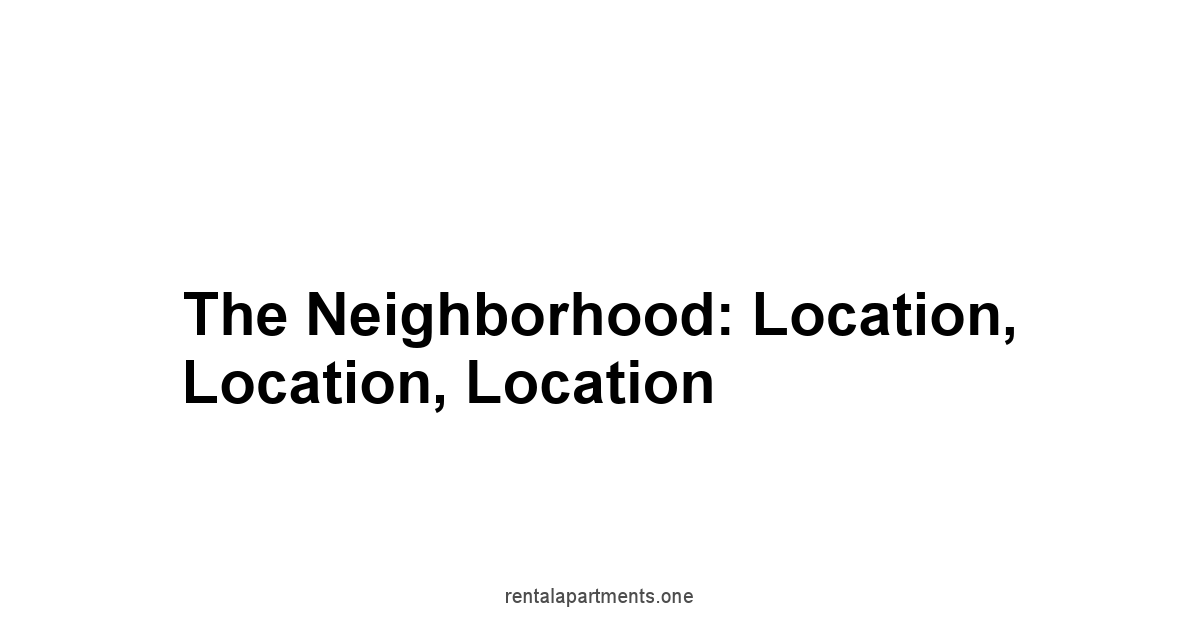
An apartment is more than just four walls. It’s also where it sits. The neighborhood shapes your daily life.
You need to understand the area as well as the apartment itself. The right location makes all the difference.
Think about your needs and preferences.
What kind of neighborhood fits you best? Walk around and get a real feel for the place.
You are not just renting an apartment, you are renting a place in the neighborhood. Make sure it’s one you want to be a part of.
What’s the area like? Walk around, get the feel.
Walk around the neighborhood during different times of the day. You want to understand the vibe of the place.
A place might look good during the day but can feel completely different at night.
- Why It Matters: The neighborhood affects your safety, convenience, and enjoyment.
- What to Look For:
- Safety: Do you feel safe walking around?
- Cleanliness: Are streets clean? Is there trash everywhere?
- Appearance: Are the buildings and homes in good condition?
- Community Atmosphere: Do the neighbors interact?
- Amenities: Are there parks, restaurants, and coffee shops nearby?
- Walk It:
- Daytime Walk: Get a general feel for the area.
- Nighttime Walk: Check for noise, safety, and activity levels.
- Weekends: See what the area is like when people aren’t working.
- Observe: Notice the details, see if it is a place you could live in. The best way to know it is by experiencing it.
What’s the noise level? Day and night.
Noise can affect your peace. A noisy neighborhood can be disruptive.
Check the noise levels at different times of the day to get a real feel of the place.
You want to live in a place where you can relax and sleep.
- Why It Matters: Noise can impact your sleep, your focus, and your overall wellbeing.
- Daytime Noise:
- Traffic
- Construction
- Kids playing
- Loud podcast
- Nighttime Noise:
- Parties
- Bar patrons
- Neighbor noise
- How to Check:
- Visit at Different Times: Morning, afternoon, and night.
- Sit Quietly: Listen for sounds inside and outside the apartment.
- Talk to Neighbors: Ask about the noise level.
- Check Online Reviews: Sometimes people mention noise issues.
- Note: Pay attention to specific sounds that bother you. A constant hum might be tolerable for some people, but a nightmare for others.
Where’s the nearest grocery store? Important for life.
A nearby grocery store is key to everyday convenience.
You need to be able to get the things you need, without hassle. It should be close by and easy to get to. This is important for making life easy.
- Why It Matters: Having a grocery store nearby can make a huge difference in your daily life.
- Distance and Accessibility:
- How far is the closest grocery store?
- Is it easily accessible by foot, car, or public transportation?
- Is it a large supermarket or a smaller local store?
- Types of Stores:
- Supermarkets: Offer a wide variety of products and good prices.
- Local Markets: Often have fresh produce and speciality items.
- Convenience Stores: Good for quick trips, but more expensive.
- Consider: Check the store hours, if there’s parking, and the overall quality of the store. Make sure it is a place you want to frequent.
How’s the public transportation? If you need it.
If you rely on public transport, this is crucial.
Check for bus stops, train stations, and other options.
Make sure you can easily get to your work, and to the places you want to go.
You don’t want to have to rely on ride sharing, that gets expensive fast.
- Why It Matters: Public transportation can affect your commute and your access to the city.
- Options to Check:
- Bus Stops: How close are they?
- Train Stations: How long does it take to walk or drive?
- Subway: Is the location close to the subway?
- Bike Lanes: Are there safe bike lanes?
- Accessibility:
- Frequency: How often do buses or trains run?
- Coverage: Do the routes cover the areas you need to get to?
- Walkability: Is the area walkable to the transit stations?
- Research: Look at the route maps. Check the schedules and how long the trips take. Don’t just assume it is easy, double check.
What about parking? Is it included, or extra?
Parking can be a hassle if it is not included.
Check if there is parking, if it’s assigned and the cost. This can be a serious pain if you are not prepared. Make sure you have a plan for your car.
- Why It Matters: Parking availability affects convenience, time, and potentially your budget.
- Parking Options:
- Assigned Spots: Is your spot assigned, or first come first served?
- Garage Parking: Is there a garage? What’s the extra cost?
- Street Parking: Is street parking free, or metered?
- Guest Parking: Is there space for your guests?
- Cost: Is the parking included in rent, or an extra fee?
- Availability: Is there enough parking for everyone who needs it? Is it easy to access?
- Check: Walk the parking lot, and make sure it’s a space you can live with. Don’t take the landlord’s word for it, see it for yourself.
Rules and Regulations: Know the Deal
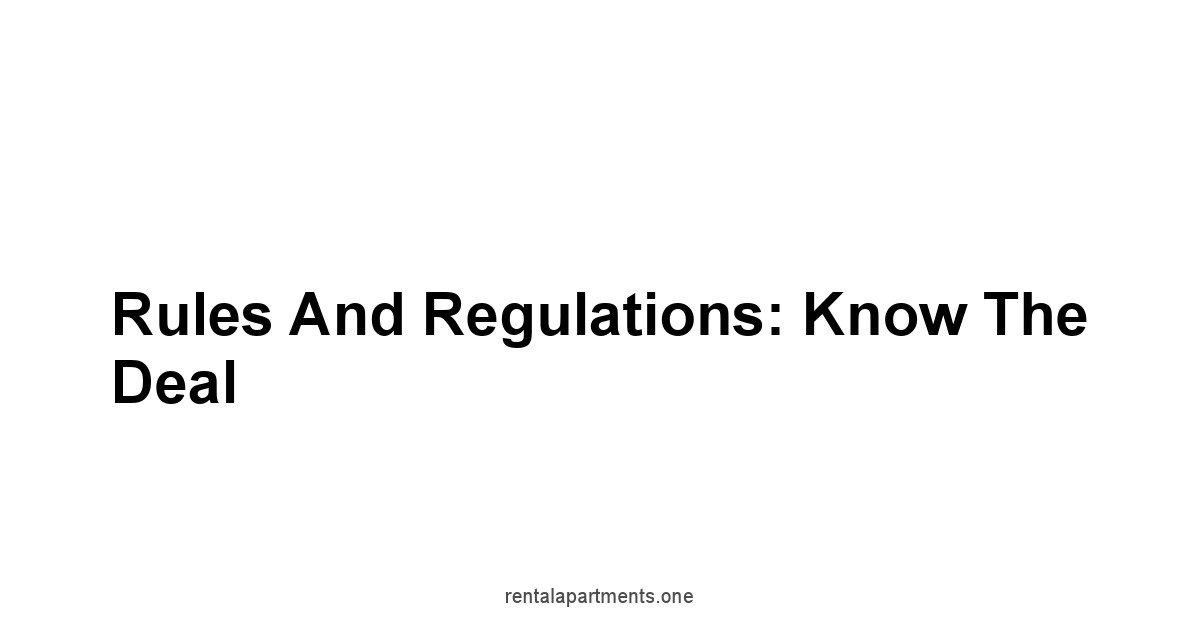
Every apartment has its rules.
You need to understand these rules before you move in.
Not knowing the rules can lead to conflicts and stress.
It’s better to know the lay of the land before you sign.
Read the lease carefully. These are the rules you’ll be living by. It’s better to know them before you sign anything.
These things may be boring to read, but not knowing them can cost you money and peace of mind.
What’s the pet policy? If you have a furry friend.
If you have a pet, you need to know the policy.
Not all apartments allow pets, and they can have restrictions on size, breed or type.
Don’t assume they’ll be fine with it, and it’s best to ask.
- Why It Matters: You need to know if your pet is allowed and if there are any pet fees or additional rent.
- Pet Restrictions:
- Weight Limits: Some apartments have weight limits.
- Breed Restrictions: Some places don’t allow certain breeds.
- Types of Pets: Some places allow cats but not dogs.
- Pet Fees/Rent:
- Pet Deposit: A fee to cover pet damages.
- Monthly Pet Rent: An extra fee charged each month.
- One Time Fees
- Documentation: Check if you need to provide vet records and shots info.
- Important: Don’t try to hide a pet, the consequences can be bad. Always ask first.
Any rules about guests? Important to know.
Guest policies can vary from place to place. Know what’s allowed and what’s not.
There may be limits on how many guests can stay, and how long they can stay. These are things you need to know.
- Why It Matters: Guest policies can affect your ability to host friends and family.
- Common Guest Rules:
- Overnight Guests: Are there limits on how many overnight guests are allowed?
- Long-Term Guests: How long can guests stay before they are considered a tenant?
- Guest Parking: Is there parking for your guests?
- Guest Use of Amenities: Can guests use the gym or pool?
- Always Check: Ask the landlord to clarify any guest policies.
- Know your rights: Some rules might be against local housing laws. Be sure of your rights.
- Avoid problems: Communicate with your landlord about guests to avoid conflicts later on.
What about subletting? If you may need to.
Subletting can be useful if you need to move out early.
Know the subletting policy so you are prepared, if you need it.
Not all places allow subletting, and there are often rules. It’s good to know now.
- Why It Matters: You might need to sublet if you move before your lease ends.
- Subletting Rules:
- Is it allowed?: Some leases strictly forbid subletting.
- Approval Process: Do you need to get permission from the landlord?
- Sublease Agreement: Does the landlord require a specific agreement?
- Responsibilities: Who is responsible if the sublessee causes damages?
- Alternative: If subletting is not allowed, are there other options like breaking the lease with a fee?
- Be careful: Subletting without permission can lead to penalties or even eviction.
- Know your rights: Familiarize yourself with local subletting laws.
Are there any quiet hours? Respect the neighbors.
Quiet hours are there to help maintain a peaceful environment.
Know what the quiet hours are so you can respect your neighbors. This is about mutual respect. It’s best for everyone to avoid noise complaints.
- Why It Matters: Quiet hours ensure that everyone can sleep and relax without unnecessary disturbances.
- Common Quiet Hours:
- Weekdays: Often start later at night, such as 10 or 11 PM.
- Weekends: Can sometimes start later.
- Morning hours: Some places have specific morning hours too, often before 7 or 8 AM
- Noise Levels:
- Be mindful of loud podcast, TV, and conversations.
- Respect neighbors when walking through common areas.
- Avoid loud parties, or conversations on balconies and patios.
- Always Check: Read the lease and ask the landlord for clear details.
- Be a good neighbor: Respect the quiet hours.
What’s the lease term? Make sure it works for you.
The lease term is the length of time you’re agreeing to live there. Make sure it fits your needs.
It can be bad if you’re locked into a lease you can’t get out of. Check the terms carefully.
- Why It Matters: You need a lease term that suits your plans.
- Common Lease Terms:
- Month-to-Month: More flexible but often more expensive.
- Six Months: A short-term option if you are not sure of your plans.
- One Year: The most common lease length.
- Longer Leases: Some landlords offer longer leases, 2 or 3 years.
- Options at the End of the Term:
- Renew: Can you renew at the end of your lease? What are the terms?
- Move Out: What do you need to do before moving out?
- Changes: What’s the procedure if you need to break the lease?
- Read: Go through the entire lease, make sure you understand everything, don’t be afraid to ask.
Maintenance and Repairs: How Things Get Fixed
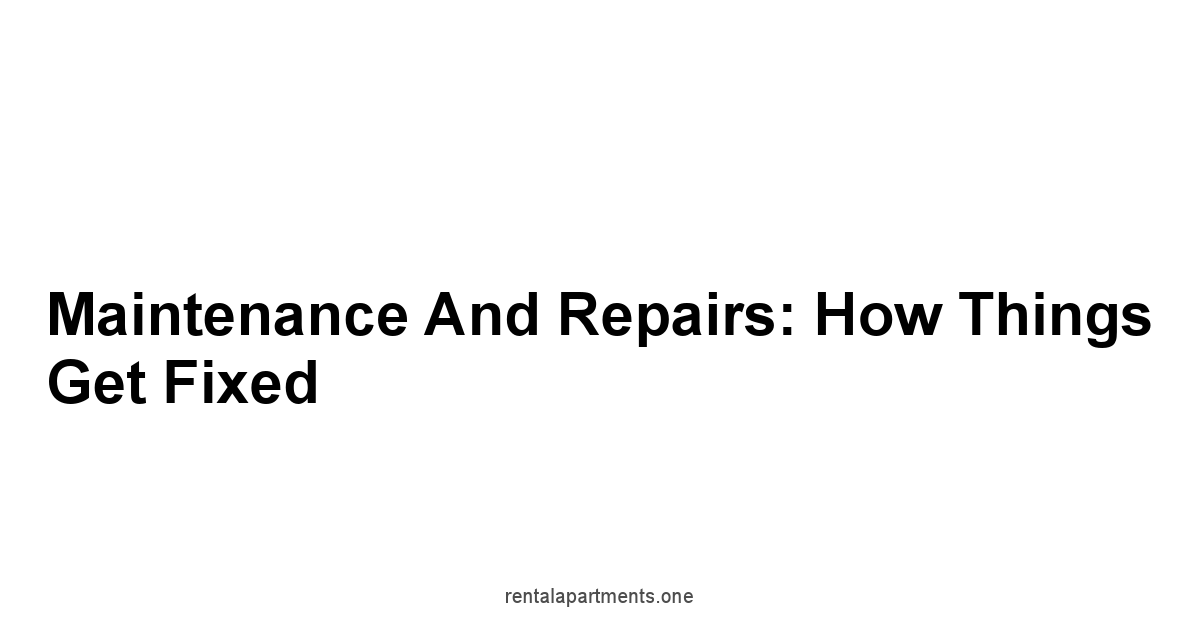
Things break. It’s a fact.
You need to know how maintenance and repairs work before they become an emergency. The faster things get fixed, the better. Being proactive now can prevent issues later.
Who you gonna call when things break? Knowing who to contact and how fast they respond is essential.
It’s not just about having a working space, it’s about making sure the place is safe, and comfortable.
Being prepared for the worst will give you peace of mind.
Who do you call for repairs? Get the contact.
You need to know who to call when things break. It should not be a mystery.
Get the right contact info, make sure you can get them when you need them. This is important when you need a fix.
- Why It Matters: Knowing the correct contact makes it easier and faster to get repairs done.
- Who to Contact:
- Landlord: The first contact for most things.
- Property Manager: For larger buildings.
- Maintenance Team: For specific types of repairs.
- Contact Info:
- Phone Number: Make sure to have the correct one.
- Email: Good for non-emergencies.
- Online Portal: Some use online systems.
- Emergency Contact: Who do you call after hours?
- Important: Keep all this information handy, so you know what to do when you need help.
How quickly do they fix things? Time matters.
How fast they respond to requests matters. A slow maintenance team can cause many problems.
A fast response can save you from damages, and headaches. This is important to make life easier.
- Why It Matters: Quick repairs keep your apartment in good condition and prevent small problems from becoming big ones.
- Response Times:
- Routine Repairs: How long does it usually take?
- Emergency Repairs: They should respond quickly.
- Average Time: Ask other tenants about typical repair times.
- Follow-Up:
- Do they keep you informed about the repair progress?
- Do they follow through until the issue is resolved?
- Things to check
- How do they handle maintenance requests?
- Do they have an online portal for maintenance request?
- What is their process?
- Important: Know the details so you don’t have to wait too long for needed repairs.
What about emergency maintenance? Get the details.
Emergencies happen.
You need to know how to deal with emergencies, not just routine repairs.
Make sure you have an emergency contact and an emergency plan.
This is critical to keeping you and your place safe.
- Why It Matters: Emergencies need quick action. You need to know how to contact help immediately.
- Types of Emergencies:
- Leaks: Water leaks can cause significant damage fast.
- Electrical Issues: Shorts or power failures.
- Plumbing Problems: Blocked toilets or burst pipes.
- No Heat or Cooling: Especially during extreme weather.
- Lockouts: If you are locked out.
- Emergency Procedures:
- Emergency Number: Who do you call after hours?
- Response Time: How quickly can they respond?
- Contact Person: Is there someone specific for emergencies?
- Important: Ask for specific procedures and make sure you understand them. You might be the one who needs to use them.
What’s their pest control policy? Nobody likes bugs.
Pests are a reality in apartments. You need to know their pest control plan.
What kind of measures do they take? This is important to keep pests away and be sure of what happens if they show up.
- Why It Matters: Pest control affects comfort and health. Bugs and rodents can be annoying.
- Pest Control Measures:
- Regular Treatments: How often do they do pest control?
- Type of Treatment: What kind of pest control do they use?
- Coverage: Does it cover all areas?
- Cost: Is the cost included in the rent, or is it an extra fee?
- What to do if pests show up:
- Who do you contact? Is there a special pest control contact?
- How fast will they respond?
- What is the plan?
- Important: A good landlord should have a plan to address pest issues.
How often is common space cleaned? Know the upkeep.
Common spaces should be clean. That can say a lot about the property management.
Dirty common spaces can feel unpleasant and cause headaches. Make sure the upkeep is done to your satisfaction.
- Why It Matters: Clean common areas make a building feel more welcoming.
- Types of Common Areas:
- Hallways: Check the cleanliness and lighting.
- Stairwells: Should be safe and clean.
- Lobbies: Clean and well-maintained.
- Laundry Rooms: Should be clean and functional.
- Gyms and Pools: If available, should be well-maintained.
- Cleaning Schedule:
- How often are common areas cleaned?
- Is there a regular schedule?
- Ask other tenants about the cleanliness.
- What to Observe: Check for clutter, trash, and how clean the place is overall. If they don’t care about this space, they won’t care about other things.
Safety and Security: Staying Protected
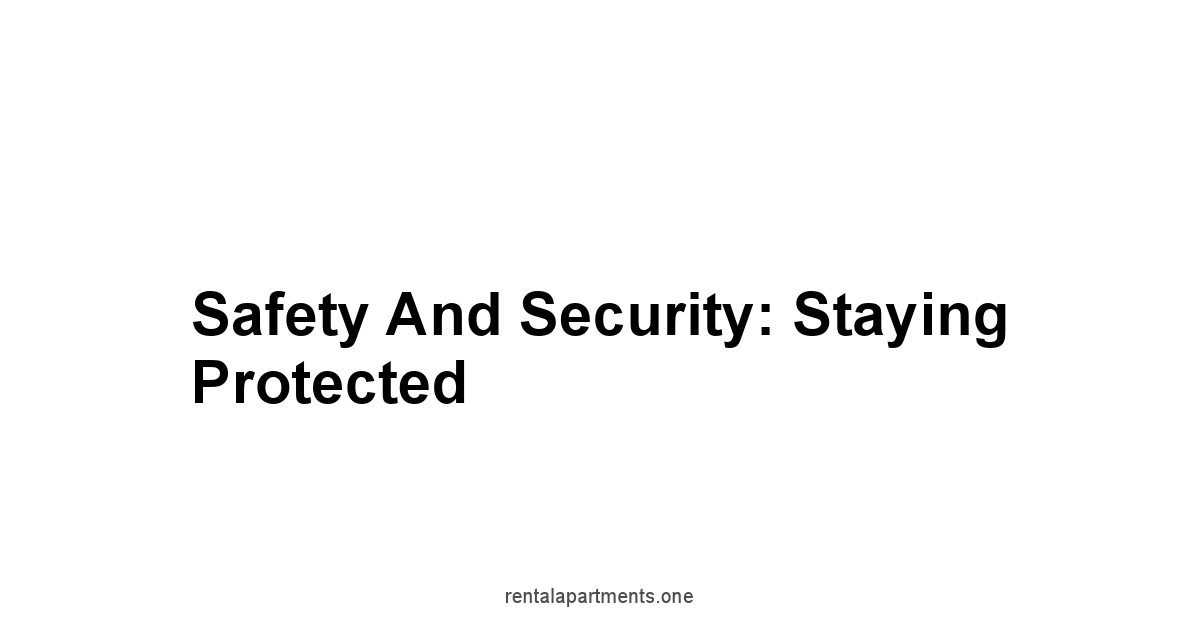
Safety is a top concern.
You want to feel safe in your own home, and around your home. It’s your right.
Take time to assess the security of the apartment, and the building. You should feel safe in your own space.
Don’t ignore your gut feelings. If something feels off, it might be. Check all the security measures. These are essential things.
You should be able to sleep soundly and live without fear. Make sure the place you are moving to is secure.
How’s the neighborhood security? Feel safe.
Walk around and observe the neighborhood. Do you feel safe? This is a basic need.
If the place doesn’t feel safe, find somewhere else to live. Trust your instincts and look around.
- Why It Matters: Neighborhood security affects your peace of mind.
- Signs of a Safe Neighborhood:
- Well-Lit Streets: Good lighting can deter crime.
- Visible Security: Police patrols or neighborhood watch.
- Low Crime Rate: Check online crime reports.
- Active Community: Neighbors who look out for each other.
- Overall feeling: Do you feel safe walking around?
- Things to Look for:
- Are there signs of vandalism?
- Are there any safety hazards like broken glass?
- Do people seem alert?
- Talk to residents: Ask other tenants about their experiences, it’s always good to know what people who live there think of the area.
Are there security cameras? Look around.
Security cameras can help in deterring crime.
Check if there are cameras and where they are located. These can be helpful when there is an incident.
Make sure the cameras are placed in the right places.
- Why It Matters: Security cameras can provide an added layer of safety and can be useful during any security incidents.
- Where Cameras Are Usually Located:
- Entrances: Main doors, parking areas.
- Hallways: To monitor common areas.
- Garages: Can help with break-ins and theft.
- Elevators: Important to deter criminal acts.
- Things to Check:
- Are there security cameras installed?
- Where are they positioned?
- Do they cover the key areas?
- How long is the footage saved for?
- Note: Security cameras are not always a guarantee of safety.
They are just an added layer of protection.
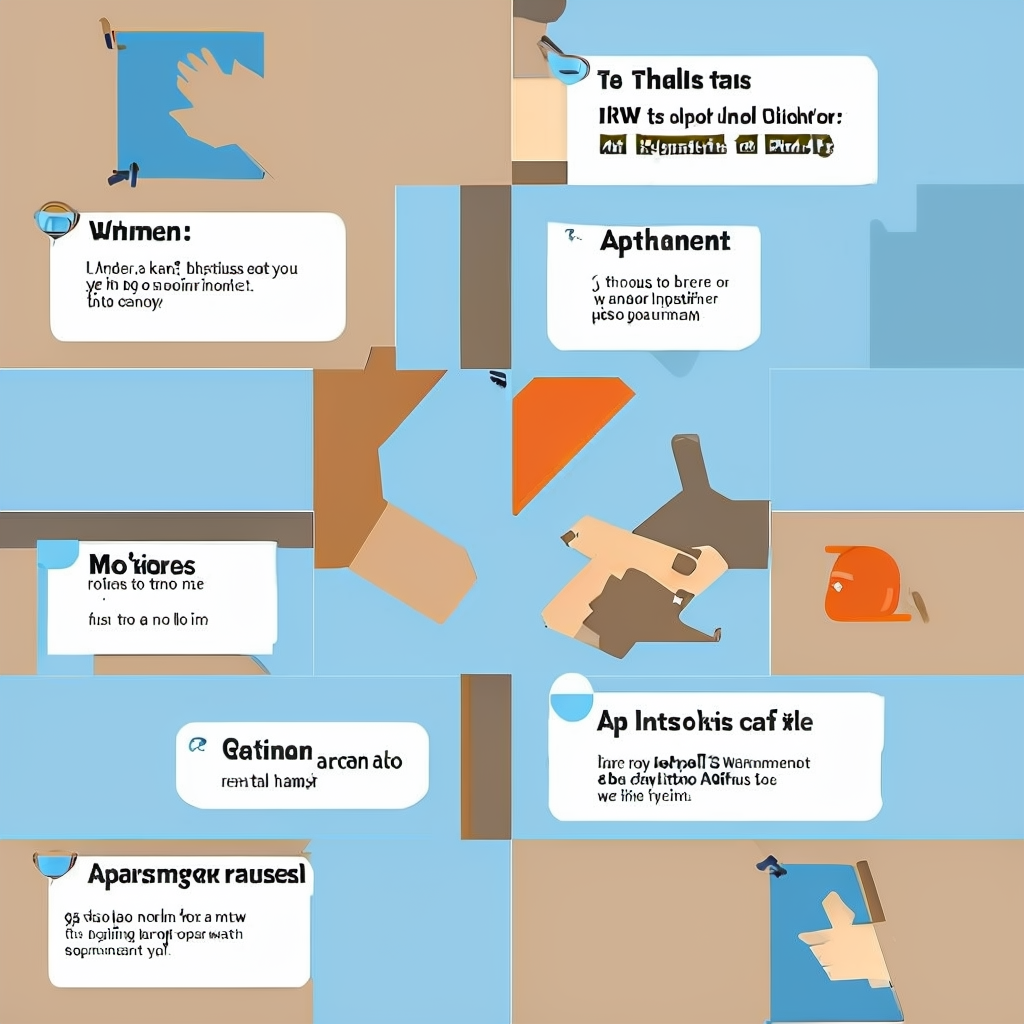
What about building access? Doors, gates, etc.
How do you get into the building? Are there good security measures? Check the doors, gates and entry systems. Good security access protects all residents.
This is essential for making people feel safe and secure.
- Why It Matters: Building access controls who can get in. It helps in keeping intruders out.
- Types of Building Access:
- Keyed Entry: Traditional locks.
- Key Fobs: Electronic access.
- Intercom Systems: To screen visitors.
- Gated Entry: For added security.
- Security Guards: If there are some on location.
- Are doors sturdy and secure?
- Do the locks work properly?
- Are there security lights near the doors?
- Are gates well maintained?
- Always test the system. Try the doors, try the keys, try everything. Make sure everything is functioning.
Are there smoke detectors, carbon monoxide detectors? Essential safety gear
Smoke and carbon monoxide detectors are crucial for safety. Check if they are installed and functioning.
Don’t move into a place without these working devices. They are literal lifesavers.
- Why It Matters: These devices alert you to dangers. They can prevent disasters.
- Requirements:
- Smoke Detectors: Should be in every bedroom and in the hallway.
- Carbon Monoxide Detectors: Should be near sleeping areas and outside of garages.
- What to Check:
- Are they installed in the right places?
- Are they functioning correctly?
- Do they have working batteries?
- Test Them: Always test the detectors before moving in and at least once a month.
- Note: If they are not installed or working correctly, inform the landlord immediately. It is their responsibility to make sure they are installed and functional.
What are the emergency procedures? Know the plan.
You need to know the emergency procedures. Knowing what to do in an emergency can save lives.
Ask about the emergency procedures so you are prepared for the worst.
It’s better to know this, and not need it than not know it and need it.
- Why It Matters: Knowing the plan helps you respond quickly during any emergency.
- Types of Emergencies:
- Fire: What’s the evacuation plan?
- Medical Emergency: Who to call for medical assistance?
- Natural Disasters: Where should you go if there’s a disaster?
- Building Issues: Leaks, power outages.
- Emergency Plan Elements:
- Evacuation Routes: Know where the emergency exits are.
- Emergency Contacts: Who to call in each scenario.
- Assembly Points: Where to meet after evacuating.
- Safety training and protocols: Does the building provide any safety training?
- Important: The building manager should have the emergency procedures laid out and visible for all.
Landlord and Management: The People You’ll Deal With

Your experience renting an apartment depends a lot on the landlord or property manager. You need to know who you’re dealing with.
A bad landlord can turn a great apartment into a nightmare. Choose wisely.
Don’t rush into renting just any place.
Take your time and get to know the person who will be responsible for your apartment. This person can make or break your experience. Choose someone you think you can work with.
How is the landlord or property manager? Get a read.
Get to know your landlord. Are
What do we think?
Choosing an apartment is not just about finding four walls, it’s about securing a place that fits your life.
It’s a decision that involves careful consideration of structure, finances, location, rules, management, and safety.
Like a well-built ship, the place you live needs a strong framework and solid foundations to withstand the storms of daily life. It’s not enough to see it, you have to know it.
From confirming the actual square footage to checking the condition of the walls, floors and ceilings, every detail matters to make sure this space will become a home.
Money matters, so don’t get distracted by the excitement of a new apartment and forget the costs beyond the rent.
Knowing what utilities are included, what the average costs are, and how much the security deposit is are all important questions that will make your life easier in the long run.
It’s also important to be aware of move-in fees, and be aware of late fees so you know how to avoid them.
It’s always best to have all the numbers figured out. No surprises.
The neighborhood is as important as the apartment itself.
The location sets the tone for your daily life, so you should walk around and get a feel for the place.
Look for the grocery store, public transportation and parking options, things that matter for your day to day.
Observe the noise levels both day and night, this can be a deal breaker for some, make sure it works for you.
It’s not just a building, it’s your community, so choose wisely.
Finally, know the rules and safety of the apartment, this is what will give you peace of mind in your new home.
This is where you will be living, so make sure they are clear about their rules, regulations, safety and management.
A good living space should be secure, well-maintained, and have clear communication with the landlord.
Do your homework, read the small print, and ask all the questions you have. This is your space, make sure it fits your life.
By doing this, you will be sure to make a place for you to create great memories.
Frequently Asked Questions
What should I ask about the apartment’s square footage?
Get the real number, not a guess.
Ask for official documentation or measure it yourself. Make sure that it includes all living spaces.
What should I look for in an apartment’s layout?
See if the layout works for your life.
Is there a natural flow between rooms? Can you visualize your furniture in the space? Think about daily living, not just pretty pictures.
What should I check on the walls, floors, and ceilings?
Look for cracks, water damage, and uneven surfaces. Tap the walls. Check the carpets and the ceilings for any stains. Small problems now can become big problems later.
How important is natural light in an apartment?
Natural light affects mood and energy. Check the number and size of windows.
See which direction they face and if anything blocks them. A dark apartment can feel depressing.
What should I consider when checking the storage space?
See if closets, cabinets, and other storage fit your needs. Open all the doors and drawers.
A lack of storage can make an apartment feel cramped.
Bring an inventory of all your things to see if it will fit.
What should I ask about included utilities?
Don’t assume anything.
Know what’s covered by rent, water, trash, sewer, etc. Get a written list. What is not included can come as a surprise later.
How do I estimate utility costs?
Ask the landlord for past averages. Check with utility companies. Account for seasonal changes.
Don’t let the power bill hit you like a ton of bricks.
How do I get my security deposit back?
Clean the apartment thoroughly and repair any damages.
Take pictures when you move in and when you move out. Follow all the lease terms. It’s your money, make sure you can get it back.
What kind of move-in fees should I be aware of?
Look out for application fees, admin fees, move-in fees, and pet fees. Read the fine print. Ask for a breakdown, and try to negotiate.
What are late fees and how can I avoid them?
Late fees are extra charges for paying rent late. Set up reminders, and use automated payments. Know your grace period.
Communicate with the landlord if you are going to be late.
What is the best way to get a feel for the neighborhood?
Walk around during different times of the day and night.
Check for safety, cleanliness, and community atmosphere. See if it is a place you could live in.
How can I check the noise level of an apartment?
Visit at different times of the day and sit quietly and listen. Talk to current neighbors. Check online reviews.
Why is the grocery store location important?
A nearby store makes life more convenient.
Check the distance, accessibility, store type, and hours. It makes a big difference in your daily life.
What should I look for in public transportation?
Check the location of bus stops and train stations.
How often do they run? How long does it take to walk or drive?
What about parking? Is it usually included with the apartment?
Check if there’s assigned parking, a garage, or street parking. Check if there is a cost.
If the parking is first come first served, see if there is enough for all residents.
How important is the pet policy?
If you have a pet, you need to know the rules. Check for size, breed, and type restrictions.
Ask about pet deposits and pet rent, these can add up.
What should I know about guest policies?
Check if there are limits on overnight guests or long-term stays.
Also check for guest parking and guest access to amenities.
Is it important to know about subletting?
Yes. Know the policy if you need to move out early.
Some places don’t allow subletting, and they can have specific rules.
What are quiet hours and why should I care about them?
Quiet hours are for peace and quiet. Check the hours to respect your neighbors.
Be mindful of loud noises, especially during night hours.
What should I consider about the lease term?
The lease term is how long you agree to live there. Make sure it fits your plans. Know your options at the end of the lease.
Who should I contact for repairs?
Get the landlord’s or property manager’s contact info. Ask if there is also a maintenance team. Get phone, email, and online portal info.
How quickly should maintenance issues be fixed?
Fast repairs keep your apartment in good condition.
Check typical response times for routine and emergency repairs.
What should I know about emergency maintenance?
Emergencies need quick action. Get the emergency contact info.
Know who to call after hours, and ask for the emergency plan procedures.
How should I inquire about pest control?
Check how often the property treats for pests.
What kind of treatment do they use? Is there an extra cost? If pests show up, who do you contact?
How often are common spaces cleaned?
Check the cleanliness and upkeep of hallways, stairwells, lobbies, etc. A dirty common area can be a red flag.
How important is neighborhood security?
Very important, you need to feel safe where you live. Check the lighting and visible security.
Look for an active community and check online crime reports.
Are security cameras beneficial?
Security cameras can deter crime.
See where they are located and if they cover key areas.
They are an added layer of protection, but not a guarantee.
What should I check about building access?
How do you get into the building? Check the doors, gates, and entry systems.
The security should be well-maintained and functional.
Why are smoke and carbon monoxide detectors essential?
They alert you to dangers and can prevent disasters. Check if they are installed and working correctly.
You should also test them before moving in, and every month after that.
What emergency procedures should I be aware of?
Know evacuation routes, emergency contacts, and assembly points.
You should also know the plan for medical emergencies, natural disasters, and building issues.
How important is the landlord or property manager?
They make a big difference in your experience.
Get to know them, and see if you feel you can work with them.

